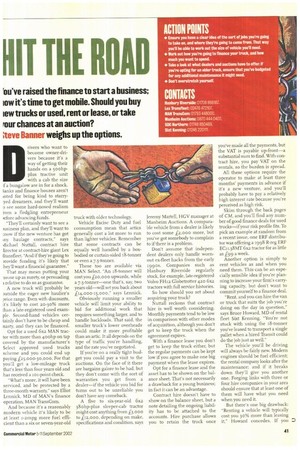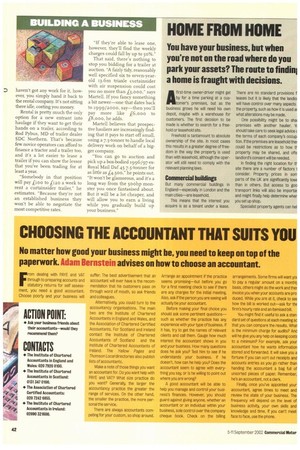II IT THE R 00
Page 41

Page 42

If you've noticed an error in this article please click here to report it so we can fix it.
bu've raised the finance to start a business: low it's time to get mobile. Should you buy lew trucks or used, rent or lease, or take rour chances at an auction?
■ teve Banner weighs up the options.
rivers who want to become owner-drivers because it's a way of getting their hands on a 5oohpplus tractive unit with a cab the size f a bungalow are in for a shock. tanks and finance houses aren't toted for being kind to starryyed dreamers, and they'll want o see some hard-nosed realism tom a fledgling entrepreneur iefore advancing funds.
"They'll certainly want to see a >usiness plan. and they'll want to mow if the new venture has got iny haulage contracts," says vlichael Nuttall, contract hire lirector at contract-hire giant Lex fransfleet. "And if they're going to 3rovide funding it's likely that hey'll want a financial guarantee."
That may mean putting your louse up as surety, or persuading 'relative to do so as guarantor.
A new truck will probably be 3utside the eager new haulier's price range. Even with discounts, it's likely to cost 20-30% more than a late-registered used example. Second-hand vehicles certainly don't have to be cheap and nasty, and they can be financed.
Opt for a used 6x2 MAN tractor with more than 400hp on tap covered by the manufacturer's Select approved used trucks scheme and you could end up paying /25,000-30,000. For that you'll get a low-mileage truck that's less than four years old and has received a 101-point check.
"What's more, it will have been serviced, and be protected by a three-month warranty," says Elliot Lennick, MD of MAN's finance operation, MAN TransCom.
And because it's a reasonably modern vehicle it's likely to be at least 1-2mpg more fuel efficient than a six or seven-year-old
truck with older technology.
Vehicle Excise Duty and fuel consumption mean that artics generally cost a lot more to run than lighter vehicles. Remember that some contracts can be equally well handled by a boxbodied or curtain-sided t8-tonner or even a 7.5-tonner.
These too are available via MAN Select. "An i8-tonner will cost you £20,000 upwards, while a 7.5-tonner--one that's, say, two years old—will set you back about /14,000-15,000," says Lennick.
Obviously running a smaller vehicle will limit your ability to bid for additional work that requires something larger, and to handle bacldoads. That said, the smaller truck's lower overheads could make it more profitable than an artic. It all depends on the type of traffic you're handling, and the rate you've negotiated.
If you're on a really tight budget you could pay a visit to the auctions. On the face of it there are bargains galore to be had, but they don't come with the sort of warranties you get from a dealer—if the vehicle you bid for turns out to be unreliable you don't have any comeback.
A five to six-year-old 6x2 38ohp-plus sleeper-cab tractor might cost anything from /3,000 to f12,000, depending on make, specifications and condition, says
Jeremy Martell, HGV manager at Manheim Auctions. A comparable vehicle from a dealer is likely to cost some £2,000 more, but you've got somebody to complain to if there is a problem.
Don't assume that independent dealers only handle wornout ex-fleet hacks from the early 1990s. Companies such as Hanbury Riverside regularly stock, for example, late-registered Volvo FHI2 Globetrotter 420 GX2 tractors with full service histories.
So how should you set about acquiring your truck?
Nuttall reckons that contract hire is well worth considering. Monthly payments tend to be low in comparison with other modes of acquisition, although you don't get to keep the truck when the agreement expires.
With a finance lease you don't get to keep the truck either, but the regular payments can be kept low if you agree to make one big payment when the lease expires.
Opt for a finance lease and the asset has to be shown on the balance sheet. That's not necessarily a drawback for a young business; in fact it can be an advantage.
Contract hire doesn't have to show on the balance sheet, but a note detailing the ongoing liability has to be attached to the accounts. Hire purchase allows you to retain the truck once you've made all the payments, but the VAT is payable up-front—a substantial sum to find. With contract hire, you pay VAT on the rentals, so the burden is spread.
All these options require the operator to make at least three months' payments in advance if ifs a new venture, and you'll probably have to pay a relatively high interest rate because you're perceived as high risk.
Skim through the back pages of CM, and you'll find any number of good finance deals for used trucks—if your risk profile fits. To pick an example at random from a recent issue, one ERF distributor was offering a 1998 R-reg ERF ECii.38MT 6x2 tractor for as little as /99 a week.
Another option is simply to rent vehicles as and when you need them. This can be an especially sensible idea if you're planning to increase your firm's carrying capacity, but don't want to commit yourself to a finance deal.
"Rent, and you can hire the van or truck that suits the job you're doing on the day in question," says Bruce Howard, MD of rental fleet Sixt Kenning. "You're not stuck with using the t8-tonner you've leased to transport a single pallet when a hired Transit could do the job just as well."
The vehicle you'll be driving will always be fairly new. Modern engines should be fuel efficient; the rental company looks after the maintenance; and if it breaks down they'll give you another one. Forging links with three or four hire companies in your area should ensure that at least one of them will have what you need when you need it.
But there's one big drawback: "Renting a vehicle will typically cost you 30% more than leasing it," Howard concedes. If you 0
0 haven't got any work for it, now ever, you simply hand it back to the rental company. It's not sitting there idle, costing you money.
Rental is pretty much the only option for a new entrant into haulage if they want to get their hands on a trailer, according to Rod Pybus, MD of trailer dealer SDC Northern. That's because few novice operators can afford to finance a tractor and a trailer too, and it's a lot easier to lease a trailer if you can show the lessor that you've been trading for at least a year. "Somebody in that position will pay Imo to L120 a week to rent a curtains ider trailer," he estimates. "Because they're not an established business they won't be able to negotiate the most competitive rates. "If they're able to lease one however, they'll find the weekly charges could fall by up to 5o%." That said, there's nothing to stop you bidding for a trailer at auction. "A fairly tidy, reasonably well specified six to seven-yearold 13.6m triaxle curtainsider with air suspension could cost you no more than £3,000," says Martell. If you fancy something a bit newer—one that dates back to 1999/2000, say—then you'll pay more like i6,000 to 0.000, he adds. Martell believes that prospective hauliers are increasingly finding that it pays to start off small, using a 7.5-tonner to handle local delivery work on behalf of a bigger company. "You can go to auction and pick up a box-bodied 1996/97 exRoyal Mail Daf 45 7.5-tonner for as little as £4,500," he points out. "It won't be glamorous, and it's a long way from the 5oohp monster you once fantasised about. But it will be a lot cheaper, and will allow you to earn a living while you gradually build up your business."




























































































































































